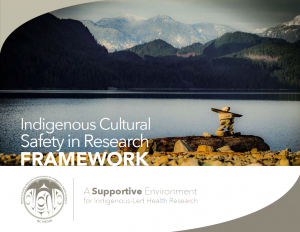BC NEIHR Indigenous Cultural Safety in Research (ICSR) Framework
Indigenous Cultural Safety (ICS) and Anti-Racism in the Context of Research
BC health authorities have implemented several cultural safety training opportunities, including in-person training sessions, workshops and webinars. In particular, the Provincial Health Services Authority (PHSA) created and hosts the well-respected San’yas Indigenous Cultural Safety Training program, which offers facilitated online cultural safety training to health service providers, staff and management in all BC health authorities. Cultural safety is no less critical to the practice of research. Several of the same inequities in decision-making power and risk to individuals, families, communities and Nations exist in both spheres. Therefore, it is imperative that we create guidelines and processes that ensure meaningful and culturally safe plans and practices in Indigenous health research relationships and projects.
Clearly, there is a need for post-secondary institutions, Research Ethics Boards (REBs), funders and other research organizations to adopt Indigenous cultural safety (ISC) and anti-racism as a pillar of research ethics, reflecting section 15 of the Charter of Rights and Freedoms and Chapter 9 of Tri-Council Policy Statement: Ethical Conduct for Research Involving Humans (TCPS), which prohibits discrimination based on race and affords everyone the right to equal protections and benefit of the law.
As outlined by CIHR (2020), Indigenous health research is based on the right to respectful engagement and equitable opportunities. To this end, CIHR sets out ‘guidelines’ to assist researchers and institutions in carrying out ethical and culturally safe research involving Indigenous peoples. However, such guidelines are only “voluntarily assumed by the researcher in return for the funding” (CIHR, 2020, np.). Members of BC NEIHR assert that relying on ‘voluntarism’ to guidelines is not enough to ensure ethical and culturally safe research. In response, the BC NEIHR has developed an Indigenous Cultural Safety in Research (ICSR) Framework.
The BC NEIHR ICSR Framework intends to address anti-Indigenous racism in research on two levels. First, it addresses the harm, discrimination and barriers Indigenous researchers continue to experience when pursuing research funding and ethics review processes, as well as engaging with structural environments such as institutional standards for research career pathways (e.g., ‘publish or perish’). For example, in the ethics review process, non-Indigenous reviewers often lack an understanding of Indigenous research relationships and protocols as well as their own biases. Moreover, Indigenous researchers typically hold broader accountabilities (e.g., future generations, the land, family and community, etc.) with which western institutions are unfamiliar (CIHR, 2020).
Second, the framework will address potential harm perpetuated by non-Indigenous researchers who are not adequately trained in ICSR and propose to conduct research with Indigenous communities, collectives or organizations (ICCOs). For example, institutions must mandate ICSR sanctioned training and oversight of research led by non-Indigenous researchers.
To read the BC NEIHR ICSR Framework: Click here

